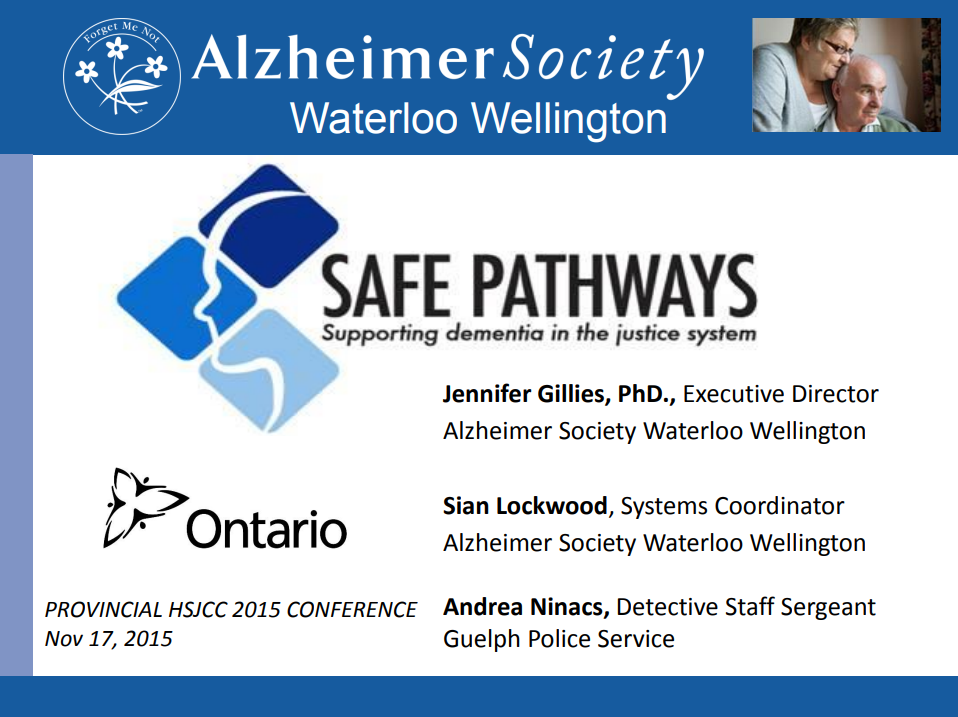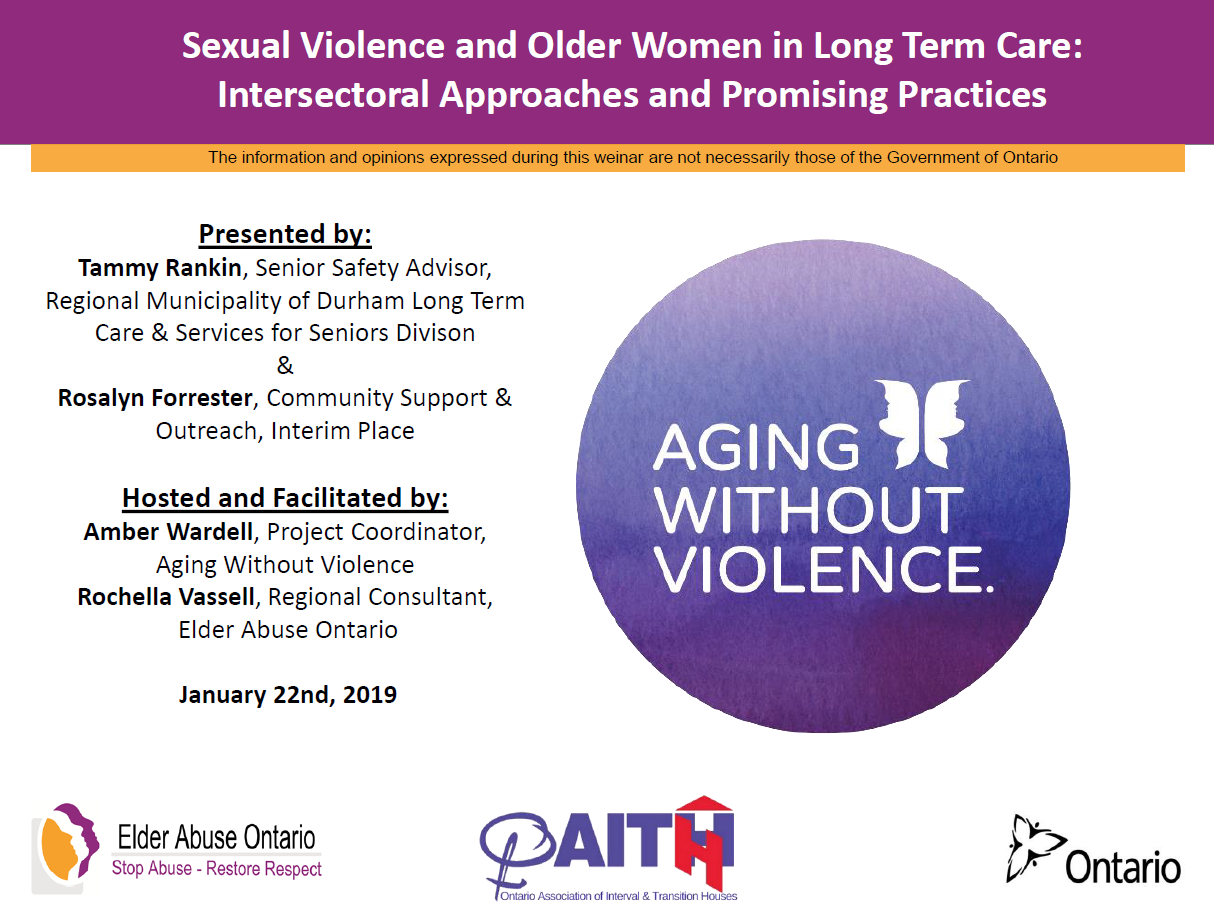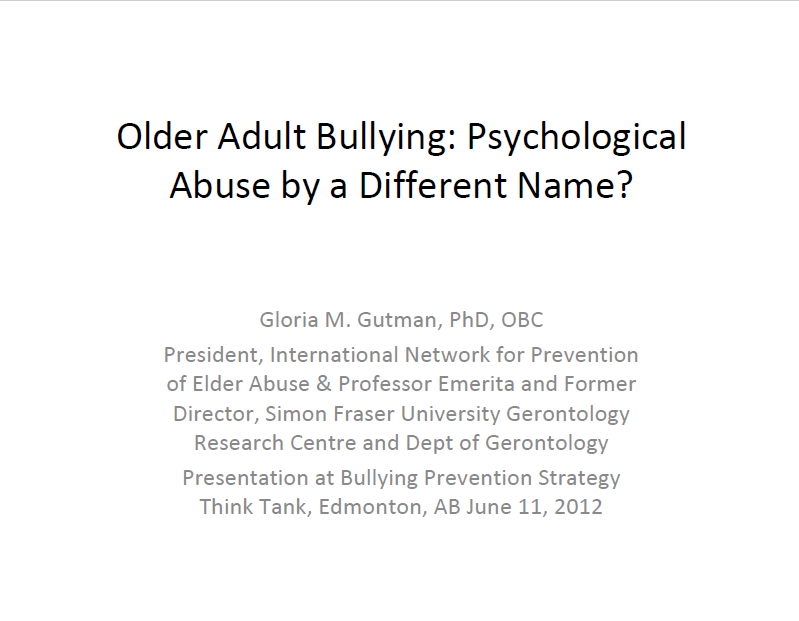Workshops & Presentations

This project is working to reduce the likelihood that seniors with dementia will enter the criminal justice system due to behaviours that may cause harm and result in a criminal offence. A criminal offence can range from less serious to more serious in nature. The overall intent of the project is to improve the quality of life for individuals with dementia and their care partners. To reach these goals, the project will consist of:
- developing an education and awareness initiative for police services, care partners, health care providers, and the community that will identify the risk factors and legal procedures.
- working with police services, the justice system, health care providers, and key stakeholders to explore best practices and develop a Safe Pathway response program for persons with dementia (with a focus on persons with frontal lobe dementia) who may be at risk of entering the criminal justice system.
- creating a support system for those persons with dementia and their care partners who have already entered the judicial system.
Source: Alzheimer Society Waterloo Wellington
This webinar by Seniors First BC lays out existing supports and breaks down who to reach out to when assisting older adults, utilizing the Decision Tree available on the Public Guardian and Trustee website and on this website.
Presenters
- Genevieve Smith (Seniors First BC)
- Alison Leaney (Public Guardian and Trustee)
- Nighat Afsar (Seniors First BC, legal advocate)
- Sarah Khan (Seniors First BC)
- Leann Lange (Fraser Health)
- Marnie Stickley (Family Services of Greater Vancouver)
The following is part of our project “Increasing Access to Justice for Older Adult Victims of Sexual Assault: A Capacity Building Approach”, funded by the Justice Canada Victims Fund.Learn more about this project or consult the full list of resources
Violence against Older Women is an increasingly growing problem not only in Ontario, but across Canada and around the world. Numerous communities are working diligently to prevent and address this issue. Through this webinar, Aging Without Violence, and OAITH in partnership with Elder Abuse Ontario present important information related to addressing violence against older women.
Video recording and French version coming soon.
Source: Elder Abuse Ontario
Presentation at Bullying Prevention StrategyThink Tank, Edmonton, AB - June 11, 2012
Gloria M. Gutman, PhD, OBC President,
International Network for Prevention of Elder Abuse & Professor Emerita and Former Director, Simon Fraser University Gerontology Research Centre and Department of Gerontology
''While most people think of bullying as something done to children by other children,bullying can be perpetrated and experienced by people of any age. This presentation focuses on senior bullying.
- Settings where it occurs
- Characteristics of Perpetrators and Victims
- Impact on victims and bystanders
- Extent of the Problem
- Potential Interventions''
Source: Gloria Gutman
The following is part of our project “Increasing Access to Justice for Older Adult Victims of Sexual Assault: A Capacity Building Approach”, funded by the Justice Canada Victims Fund.Learn more about this project or consult the full list of resources
"Worldwide, the majority of the older adult population is women and as this population grows the issue of violence against older women will also continue to increase.
Recognizing the growing prevalence of violence against older women and lack of a full complement of available resources, a series of video learning modules on strategies to address this issue was developed by Women’s College Research Institute, the Ontario Network of Sexual Assault/Domestic Violence Treatment Centres, and Elder Abuse Ontario.
The video learning modules have been designed to benefit a variety of organizations and individuals connected to violence against older women including researchers, trainees, government-decision makers, frontline healthcare professionals, family members, and the public.
The video learning modules can be viewed either as a complete series or individually, based on the video learning objectives that are most applicable, with a certificate following completion of a very short post-module survey for each module.''
The modules are as follows:
- Competing Frameworks of Elder Abuse and Violence Against Women
- Activism and Advocacy for Bringing About Change for Abused Older Women
- Promising Practices for Responding to Older Women who have Experienced Violence
- Public Awareness and Community Mobilization to Address Domestic Violence in Older Women
- Building Partnerships Across the Violence Against Women and Elder Abuse Sectors
Page 3 of 10


















